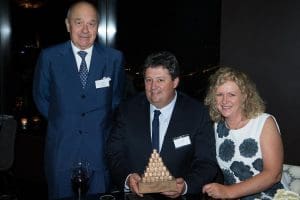
Alberton Barberis Canonico, left, with VBC Wool Excellence Award winners Garry and Sharon Meek.
MININERA superfine woolgrowers Garry and Sharon Meek have won the prestigious Vitale Barberis Canonico Wool Excellence Award with a focus on producing superfine Saxon wool with special qualities.
The Italian fabric manufacturer said the Meeks’ winning wool clip displayed the unique Saxon style and character with a very traditional fine crimp.
The staple in the Meek wool clip was very dense and had a superior elasticity or resistance to compression, which is typical of the Saxon breed and desired by Vitale Barberis Canonico.
Mr Meek said wool density is the key criteria, starting with personal selection of Sierra Park rams.
“We probably stopped chasing the finest micron years ago and I tried to pick the densest heavier cutting wools that I could get in that true Saxon type – which is the brightest true-to-type white wools that are true to count.”
The third generation wool grower said one of his key wool production goals was tensile strength.
“It is our goal in growing wool and Barberis’ preference is to buy wools that are 40 Newtons/kilotex or stronger.
“Our fleece wools last year mostly fitted that criteria – from 37-45 N/kt,” he said.
“It’s hard to do that every year in the Western District because of our hot dry summers and lush wet springs.”
Mr Meek said last season’s short spring followed by a long hot summer and a pretty tight autumn meant a strict feeding regimen of wheaten hay and barley grain was needed for his sheep in the 12 months up until shearing in August.
“It is trying to minimalise the change in feed, and running higher stocking rates and feeding them as needed is our tool to manage that.”
Mr Meek also classes all his wool himself.
“It is something I’ve always been pretty passionate about and I like having my hands in the wool, so that’s fine.”
The Meeks have been supplying wool through New England Wool’s SustainaWOOL Integrity Scheme program for a few years. The VBC award is for growers who have been or could potentially be specially selected by the company for their Wool Excellence Club as preferred suppliers of the highest quality Saxon style wool for luxury suiting fabrics.
Three generations of Saxon wool production at Elenora
Mr Meek said his family had been producing superfine 16.5-17 micron Saxon wool “forever” at ‘Elenora’ in Victoria’s Western District, achieving an average flock wool cut of 4-4.5kg.
“My father bought rams off Bill Crawford’s father at Sierra Park, so around about 50 years ago.”
The Meeks run a self-replacing pure Saxon flock of about 3000 sheep, joining 1200 ewes, with the remainder wethers and young sheep. Wethers have been sold earlier in recent years as the flock has been reduced in favour of growing canola, wheat, barley and oats.
“It (superfine wool production) is something we’ve questioned ourselves about over the years, but I’ve had a belief that wool is a commodity and everything goes through its cycle, so we’ve been hoping the premiums would come back and it has taken a while.
“But we’ve always been told by the people that buy our wool, and Vitale Barberis Canonico is one of them, that we are growing the type of wool they want to buy, so we thought it was just a matter of time that we would become a niche market and we could attract the premiums that we require to keep growing this sort of wool.”
Mr Meek said his wool attracted a premium of about 40 percent above the AWEX Micron Price Guide for comparable wool, but would not disclose actual prices. He believed superfine wool buyers now understood the current prices were still a long way from where they needed to be, realising that quantities of this type of wool were declining each year.
“The writing is on the wall that there needs to be a fundamental lift in price for it to stay as a viable commodity.
“They have indicated that premium might increase as they get more preferred growers growing the type of wool they want,” he said.
“But it feels like we are just starting to claw back a bit of ground.”
Price levels justify holding flock numbers
Mr Meek said with the price indicators from buyers like Vitale Barberis Canonico, there is justification to hold flock numbers for a bit longer.
“We will probably need some stronger indications to increase them.
“I’m confident we will see a better era, but swapping back to 100 percent Merinos is probably unlikely in the near future.”
The Meeks were presented with their award at a dinner in Melbourne last night attended by VBC principal Alberto Barberis Canonico and raw material procurement manager Davide Fontaneto and New England Wool managing director Andrew Blanch.
The Meeks were presented with a cash prize up to the value of $50,000 along with an all-expenses paid trip to Italy to meet with Vitale Barberis Canonico representatives in the Biella region of Italy in mid-2017.
The annual ceremony was also attended by selected wool producers from NSW, Victoria and Tasmania and wool brokers.

Vitale Barberis Canonica’s Davide Fontaneto, with VBC Wool Excellence Award winners Garry and Sharon Meek.
Mr. Fontaneto said the company was proud to award not only the wool, but also the passion and the heritage behind the wool.
“The Meek family is committed to these fundamentals and the result of their hard work is fantastic wool,” he said.
“We award people, because only people can build the future and only people who continue to build can have a bright future.”

Sounds great, but is it? About $25 worth of wool, at most, in a $10,000 suit, (price mentioned in The Australian November 9, 2016) with admittedly large production costs. If the the wool buyers had paid three times as much money for the wool, the suit could still have been sold for $10,050 for the same margin of profit for the manufacturer. No wonder such large mega-yachts are floating around the Mediterranean Sea.